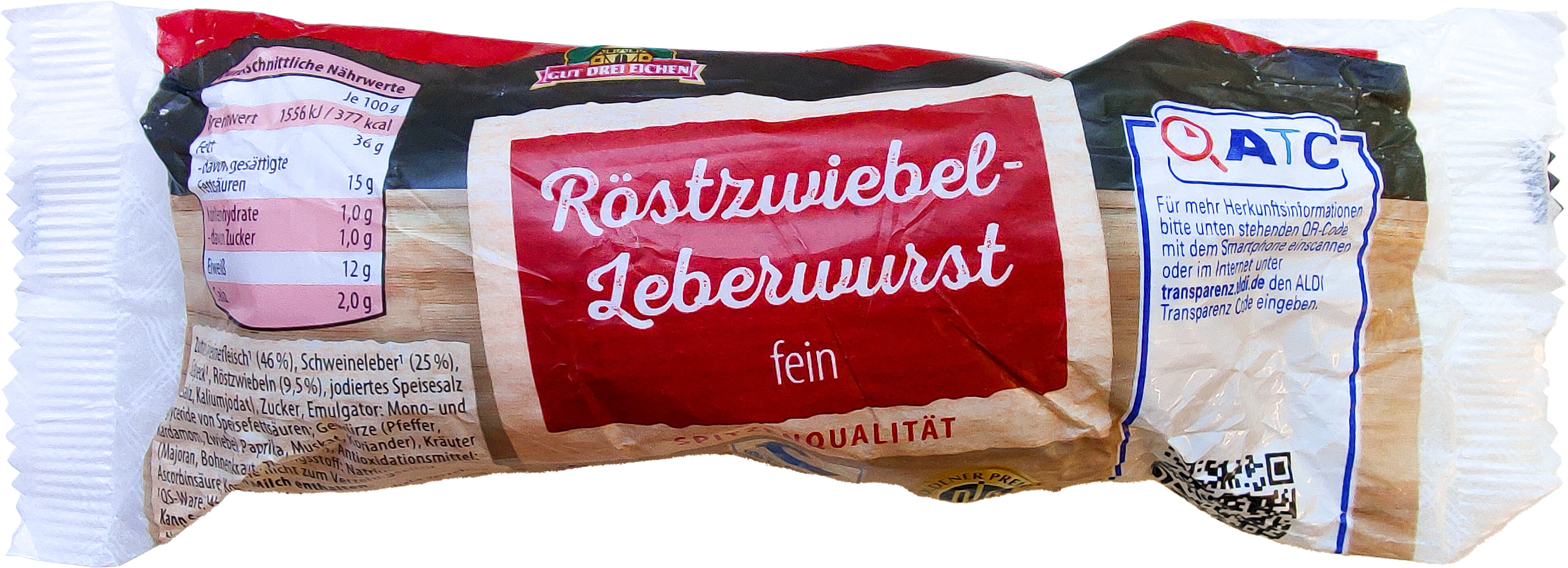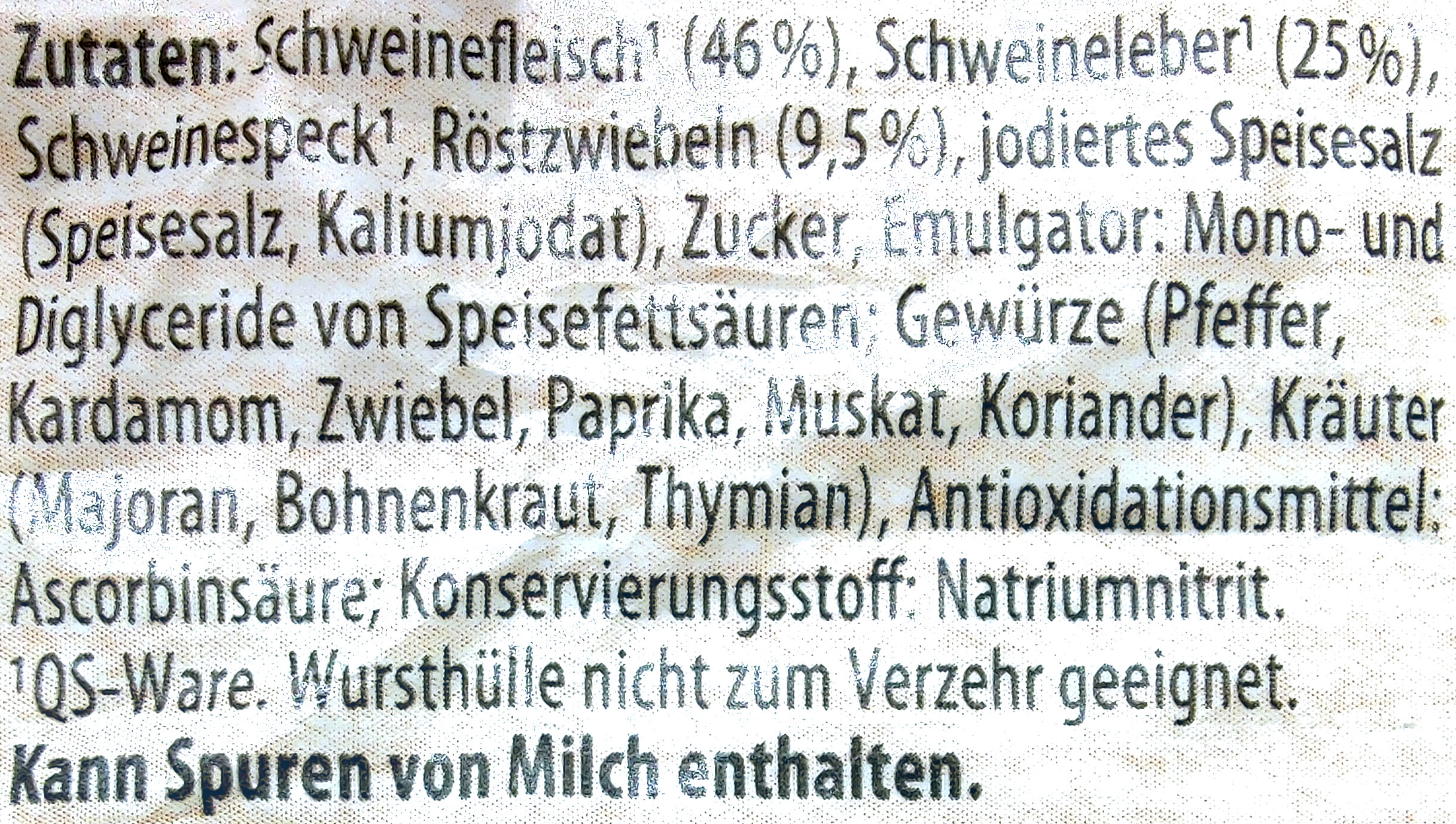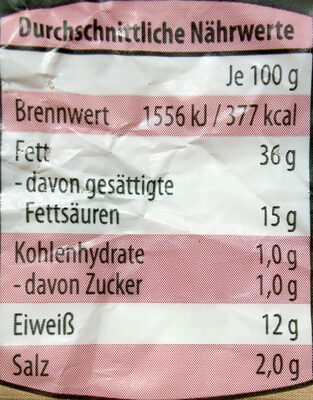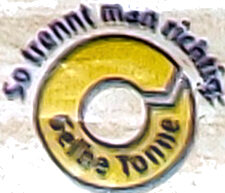Help us make food transparency the norm!
As a non-profit organization, we depend on your donations to continue informing consumers around the world about what they eat.
The food revolution starts with you!
Röstzwiebel Leberwurst fein - Gut Drei Eichen - 125 g
Röstzwiebel Leberwurst fein - Gut Drei Eichen - 125 g
Barcode: 4047247080705 (EAN / EAN-13)
Common name: Röstzwiebel Leberwurst fein
Quantity: 125 g
Brands: Gut Drei Eichen, Aldi, Stockmeyer
Categories: Meats and their products, Meats, Prepared meats, Pork and its products, Sausages, Liver sausages, Pork preparations, Pork liver sausages
Labels, certifications, awards:
German Agricultural Society, Gold medal of the German Agricultural Society, 2021 Gold medal of the German Agricultural Society, QS certification mark, de:ATC
Origin of ingredients: Germany
Manufacturing or processing places: Deutschland
Traceability code: DE EV-15 EG
Stores: Aldi
Countries where sold: Germany
Matching with your preferences
Health
Ingredients
-
25 ingredients
: Schweinefleisch 46%, Schweineleber 25%, Schweinespeck, Röstzwiebeln 9,5%, jodiertes Speisesalz (Speisesalz, Kaliumjodat), Zucker, Emulgator: Mono - und Diglyceride von Speisefettsäuren; Gewürze (Pfeffer, Kardamom, Zwiebel, Paprika, Muskat, Koriander), Kräuter (Majoran, Bohnenkraut, Thymian), Antioxidationsmittel: Ascorbinsäure; Konservierungsstoff: Natriumnitrit.Traces: Milk
Food processing
-
Ultra processed foods
Elements that indicate the product is in the 4 - Ultra processed food and drink products group:
- Additive: E471 - Mono- and diglycerides of fatty acids
- Ingredient: Emulsifier
Food products are classified into 4 groups according to their degree of processing:
- Unprocessed or minimally processed foods
- Processed culinary ingredients
- Processed foods
- Ultra processed foods
The determination of the group is based on the category of the product and on the ingredients it contains.
Additives
-
E250 - Sodium nitrite
Sodium nitrite: Sodium nitrite is the inorganic compound with the chemical formula NaNO2. It is a white to slightly yellowish crystalline powder that is very soluble in water and is hygroscopic. It is a useful precursor to a variety of organic compounds, such as pharmaceuticals, dyes, and pesticides, but it is probably best known as a food additive to prevent botulism. It is on the World Health Organization's List of Essential Medicines, the most important medications needed in a basic health system.Nitrate or nitrite -ingested- under conditions that result in endogenous nitrosation has been classified as "probably carcinogenic to humans" by International Agency for Research on Cancer -IARC-.Source: Wikipedia
-
E471 - Mono- and diglycerides of fatty acids
Mono- and diglycerides of fatty acids (E471), are food additives commonly used as emulsifiers in various processed foods.
These compounds consist of glycerol molecules linked to one or two fatty acid chains, which help stabilize and blend water and oil-based ingredients. E471 enhances the texture and shelf life of products like margarine, baked goods, and ice cream, ensuring a smooth and consistent texture.
It is generally considered safe for consumption within established regulatory limits.
Ingredients analysis
-
May contain palm oil
Ingredients that may contain palm oil: E471
-
Non-vegan
Non-vegan ingredients: Pork meat, Pork liver, Bacon
-
Non-vegetarian
Non-vegetarian ingredients: Pork meat, Pork liver, Bacon
-
Details of the analysis of the ingredients
: Schweinefleisch 46%, Schweineleber 25%, Schweinespeck, Röstzwiebeln 9.5%, jodiertes Speisesalz (Speisesalz, Kaliumjodat), Zucker, Emulgator (mono- und Diglyceride von Speisefettsäuren), Gewürze (Pfeffer, Kardamom, Zwiebel, Paprika, Muskat, Koriander), Kräuter (Majoran, Bohnenkraut, Thymian), Antioxidationsmittel (Ascorbinsäure), Konservierungsstoff (Natriumnitrit)- Schweinefleisch -> en:pork-meat - vegan: no - vegetarian: no - ciqual_proxy_food_code: 28205 - percent_min: 46 - percent: 46 - percent_max: 46
- Schweineleber -> en:pork-liver - vegan: no - vegetarian: no - ciqual_food_code: 40119 - percent_min: 25 - percent: 25 - percent_max: 25
- Schweinespeck -> en:bacon - vegan: no - vegetarian: no - ciqual_food_code: 28858 - percent_min: 11.5 - percent_max: 19.5
- Röstzwiebeln -> en:fried-onion - percent_min: 9.5 - percent: 9.5 - percent_max: 9.5
- jodiertes Speisesalz -> en:iodised-salt - vegan: yes - vegetarian: yes - ciqual_food_code: 11058 - percent_min: 0 - percent_max: 2
- Speisesalz -> en:salt - vegan: yes - vegetarian: yes - ciqual_food_code: 11058 - percent_min: 0 - percent_max: 2
- Kaliumjodat -> en:e917 - vegan: yes - vegetarian: yes - percent_min: 0 - percent_max: 1
- Zucker -> en:sugar - vegan: yes - vegetarian: yes - ciqual_proxy_food_code: 31016 - percent_min: 0 - percent_max: 1
- Emulgator -> en:emulsifier - percent_min: 0 - percent_max: 1
- mono- und Diglyceride von Speisefettsäuren -> en:e471 - vegan: maybe - vegetarian: maybe - from_palm_oil: maybe - percent_min: 0 - percent_max: 1
- Gewürze -> en:spice - vegan: yes - vegetarian: yes - percent_min: 0 - percent_max: 1
- Pfeffer -> en:pepper - vegan: yes - vegetarian: yes - percent_min: 0 - percent_max: 1
- Kardamom -> en:cardamom - vegan: yes - vegetarian: yes - ciqual_proxy_food_code: 11075 - percent_min: 0 - percent_max: 0.5
- Zwiebel -> en:onion - vegan: yes - vegetarian: yes - ciqual_food_code: 20034 - percent_min: 0 - percent_max: 0.333333333333333
- Paprika -> en:spice-or-bell-pepper - vegan: yes - vegetarian: yes - ciqual_food_code: 20041 - percent_min: 0 - percent_max: 0.25
- Muskat -> en:nutmeg - vegan: yes - vegetarian: yes - ciqual_food_code: 11048 - percent_min: 0 - percent_max: 0.2
- Koriander -> en:coriander - vegan: yes - vegetarian: yes - percent_min: 0 - percent_max: 0.166666666666667
- Kräuter -> en:herb - vegan: yes - vegetarian: yes - percent_min: 0 - percent_max: 1
- Majoran -> en:marjoram - vegan: yes - vegetarian: yes - percent_min: 0 - percent_max: 1
- Bohnenkraut -> en:summer-savory - vegan: yes - vegetarian: yes - percent_min: 0 - percent_max: 0.5
- Thymian -> en:thyme - vegan: yes - vegetarian: yes - ciqual_food_code: 11070 - percent_min: 0 - percent_max: 0.333333333333333
- Antioxidationsmittel -> en:antioxidant - percent_min: 0 - percent_max: 1
- Ascorbinsäure -> en:e300 - vegan: yes - vegetarian: yes - percent_min: 0 - percent_max: 1
- Konservierungsstoff -> en:preservative - percent_min: 0 - percent_max: 1
- Natriumnitrit -> en:e250 - vegan: yes - vegetarian: yes - percent_min: 0 - percent_max: 1
Nutrition
-
Bad nutritional quality
⚠ ️Warning: the amount of fiber is not specified, their possible positive contribution to the grade could not be taken into account.⚠ ️Warning: the amount of fruits, vegetables and nuts is not specified on the label, it was estimated from the list of ingredients: 0This product is not considered a beverage for the calculation of the Nutri-Score.
Positive points: 0
- Proteins: 5 / 5 (value: 12, rounded value: 12)
- Fiber: 0 / 5 (value: 0, rounded value: 0)
- Fruits, vegetables, nuts, and colza/walnut/olive oils: 0 / 5 (value: 0.0625, rounded value: 0.1)
Negative points: 22
- Energy: 4 / 10 (value: 1556, rounded value: 1556)
- Sugars: 0 / 10 (value: 1, rounded value: 1)
- Saturated fat: 10 / 10 (value: 15, rounded value: 15)
- Sodium: 8 / 10 (value: 800, rounded value: 800)
The points for proteins are not counted because the negative points are greater or equal to 11.
Nutritional score: (22 - 0)
Nutri-Score:
-
Nutrient levels
-
Fat in high quantity (36%)
What you need to know- A high consumption of fat, especially saturated fats, can raise cholesterol, which increases the risk of heart diseases.
Recommendation: Limit the consumption of fat and saturated fat- Choose products with lower fat and saturated fat content.
-
Saturated fat in high quantity (15%)
What you need to know- A high consumption of fat, especially saturated fats, can raise cholesterol, which increases the risk of heart diseases.
Recommendation: Limit the consumption of fat and saturated fat- Choose products with lower fat and saturated fat content.
-
Sugars in low quantity (1%)
What you need to know- A high consumption of sugar can cause weight gain and tooth decay. It also augments the risk of type 2 diabetes and cardio-vascular diseases.
Recommendation: Limit the consumption of sugar and sugary drinks- Sugary drinks (such as sodas, fruit beverages, and fruit juices and nectars) should be limited as much as possible (no more than 1 glass a day).
- Choose products with lower sugar content and reduce the consumption of products with added sugars.
-
Salt in high quantity (2%)
What you need to know- A high consumption of salt (or sodium) can cause raised blood pressure, which can increase the risk of heart disease and stroke.
- Many people who have high blood pressure do not know it, as there are often no symptoms.
- Most people consume too much salt (on average 9 to 12 grams per day), around twice the recommended maximum level of intake.
Recommendation: Limit the consumption of salt and salted food- Reduce the quantity of salt used when cooking, and don't salt again at the table.
- Limit the consumption of salty snacks and choose products with lower salt content.
-
-
Nutrition facts
Nutrition facts As sold
for 100 g / 100 mlCompared to: Pork liver sausages Energy 1,556 kj
(377 kcal)+12% Fat 36 g +21% Saturated fat 15 g +33% Carbohydrates 1 g -59% Sugars 1 g -18% Fiber ? Proteins 12 g -8% Salt 2 g -7% Fruits‚ vegetables‚ nuts and rapeseed‚ walnut and olive oils (estimate from ingredients list analysis) 0.062 %
Environment
-
Eco-Score E - Very high environmental impact
⚠ ️Select a country in order to include the full impact of transportation.The Eco-Score is an experimental score that summarizes the environmental impacts of food products.→ The Eco-Score was initially developped for France and it is being extended to other European countries. The Eco-Score formula is subject to change as it is regularly improved to make it more precise and better suited to each country.Life cycle analysis
-
Average impact of products of the same category: D (Score: 28/100)
Category: Liver sausage
Category: Liver sausage
- PEF environmental score: 1.14 (the lower the score, the lower the impact)
- including impact on climate change: 10.80 kg CO2 eq/kg of product
Stage Impact Agriculture
88.5 %Processing
4.7 %Packaging
1.6 %Transportation
1.4 %Distribution
0.8 %Consumption
3.0 %
Bonuses and maluses
-
Origins of ingredients with a medium impact
Bonus: +4
Environmental policy: +4
Transportation: 0
Origin of the product and/or its ingredients % of ingredients Impact Germany 100 %Medium
-
Packaging with a high impact
Malus: -15
Shape Material Recycling Impact 1 Bag Plastic Discard High 1 Bag Plastic Discard High
Eco-Score for this product
-
Impact for this product: E (Score: 17/100)
Product: Röstzwiebel Leberwurst fein - Gut Drei Eichen - 125 g
Life cycle analysis score: 28
Sum of bonuses and maluses: -11
Final score: 17/100
-
Carbon footprint
-
Equal to driving 5.6 km in a petrol car
1080 g CO² per 100g of product
The carbon emission figure comes from ADEME's Agribalyse database, for the category: Liver sausage (Source: ADEME Agribalyse Database)
Stage Impact Agriculture
92.1 %Processing
2.3 %Packaging
2.6 %Transportation
1.8 %Distribution
0.3 %Consumption
0.9 %
Packaging
-
Packaging with a high impact
-
Packaging parts
1 x Bag 125 g (Plastic)
1 x Bag 125 g (Plastic)
-
Packaging materials
Material % Packaging weight Packaging weight per 100 g of product Plastic
-
Transportation
-
Origins of ingredients
Origins of ingredients with a medium impact
Origin of the product and/or its ingredients % of ingredients Impact Germany 100 %Medium
Report a problem
-
Incomplete or incorrect information?
Category, labels, ingredients, allergens, nutritional information, photos etc.
If the information does not match the information on the packaging, please complete or correct it. Open Food Facts is a collaborative database, and every contribution is useful for all.












